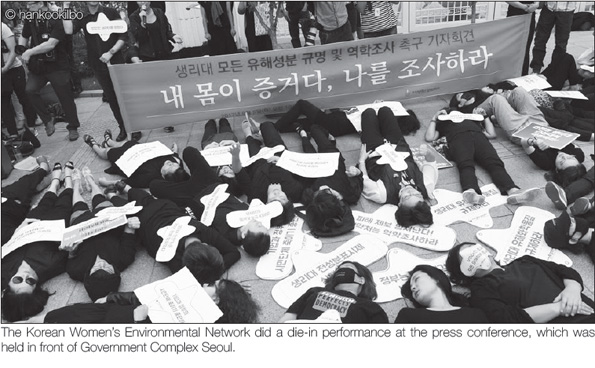
Carcinogens have recently been detected in sanitary pads, so women are now afraid of using sanitary pads. Lee Se-rim(’16, School of Information and Communication Engineering) said, “I feel a sense of betrayal because the sanitary pad is a daily necessity.” She also said, “I will find another solution like a direct purchase or using a sanitary cup because of my anxiety.”
Do you know how many sanitary pads are used during a woman’s life? Surprisingly, it is ten thousand on average. However, in March, in the evaluation of the released substances from sanitary pads which was conducted by Kim Man-gu, who is a professor of Kangwon National Univ., 22 carcinogens and toxic substances, which were banned by the International Agency for Research on Cancer(IARC) and the European Union(EU), were found in 10 internal sanitary pads. The manufacturer Kleannara of the sanitary pad brand Lilian, which had the most detected VOCs, offered a refund when the sanitary pad scandal happened, but they offered a refund price under half the price of the purchase price. Their excuse, “We unified the price because of diversity according to size and brand,” only amplified dissatisfaction among consumers.
Two complaints are being voiced due to this shock. First, the corporation didn’t do their social duties faithfully. The manufacturer Kleannara promoted that their sanitary pads were approved by the FDA when they advertised their products. However, the sale of sanitary pads is possible without the FDA’s permission. Second, this event happened because of institutional and legal flaws. VOC is a generic term meaning a liquid or gas phase organic compound that evaporates easily. Benzene, which is a VOC, is classified as a first-grade carcinogenic substance, but the inspection criteria of the Ministry of Food and Drug Safety(MFDS) don’t contain the VOCs detected in sanitary pads. The ‘whole component mark’ liability, which is essential to medicine and medical supplies, doesn’t cover sanitary pads because the sanitary pads are classified as a sanitary aid in Korea.
According to Kim Yong-dae, who is a professor of College of Medicine, said, “VOCs, which are in the adhesive section of sanitary pads, don’t touch the skin directly. However, if volatilized VOC in the adhesive is confined by underwear, it is possible that skin can absorb VOCs when women use sanitary pads. Symptoms of VOC exposure vary from a minor ailments such as a headache or fatigue to paralysis and shivering. Benzene is especially a dangerous material that can cause leukemia and aplastic anemia. Using benzene is prohibited, so I think they can’t use benzene as a base material. Detection of benzene is such a dangerous situation.”
The MFDS pointed out that inspection criteria of sanitary pads were loose at an inspection in 2005. However, these criteria have been used until now. A non-governmental organization declared that toxic substances were detected in sanitary pads at the non-governmental organization debate, and the stance of the MFDS is that it is hard to judge how harmful the sanitary pads are to the human body by only detecting emissions of toxic substances. With the phobia about sanitary pads, consumers are finding alternatives. Demand for cotton sanitary pads increased and organic sanitary pads of foreign counties have become popular among customers. Also, permission for selling menstrual cups domestically will be decided soon due to the increase of demand for the menstrual cup.
An official of the MFDS declared, “We will make a quick investigation and do our best to resolve the anxieties of customers.” It is desirable that customers be vocal about social issues, as was the case here. The customers can raise their voices through participating in class action lawsuits or joining citizen organizations. For example, in September, the Korean Women’s Environmental Network did a die-in performance at the press conference, which was held in front of Government Complex Seoul, insisting on the investigation of all ingredients in sanitary pads and an epidemiological survey. In addition, corporations should make safe products and be responsible about business ethics. Also, they should not only listen to the voices of customers but also carry out their duties with actions rather than words when a problem occurs.
By Park Jeong-min l jm38@cbnu.ac.kr
By Hong Ye-ha l yh37@cbnu.ac.kr


 All
All Society & Global
Society & Global






 Park Jeong-min & Hong Ye-ha
Park Jeong-min & Hong Ye-ha











